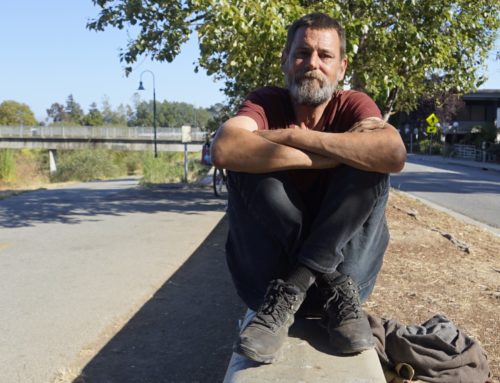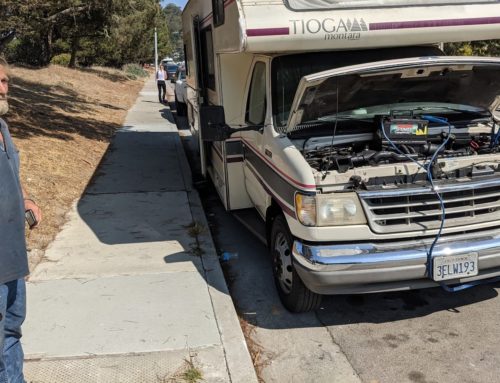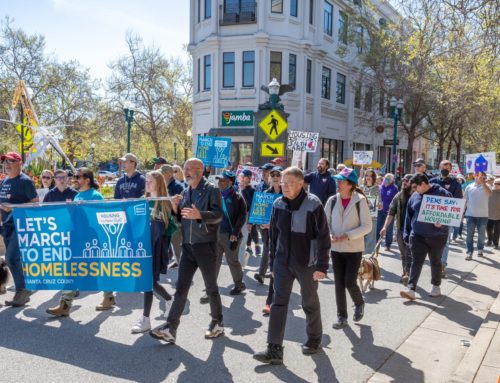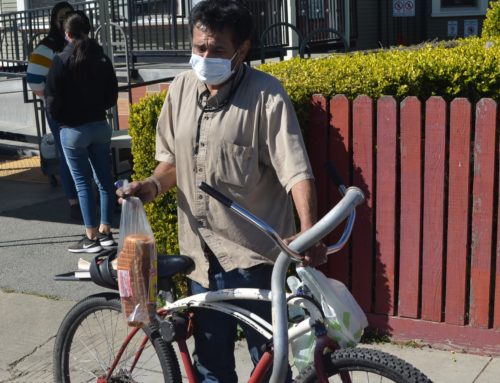For months, the City of Santa Cruz has struggled to close the Ross Camp, a homeless camp at Highway 1 and River Street. Here’s the latest chapter: a U.S. district court will decide whether the city can legally close the camp. We talk with Santa Cruz Police Chief Andy Mills and City Attorney Tony Condotti on how the court hearing went on Friday in San Jose. We also hear from Food Not Bombs co-founder Keith McHenry, who is part of a group that sued the city over the camp’s pending closure. He says closing the camp doesn’t give a real solution to the people living there.
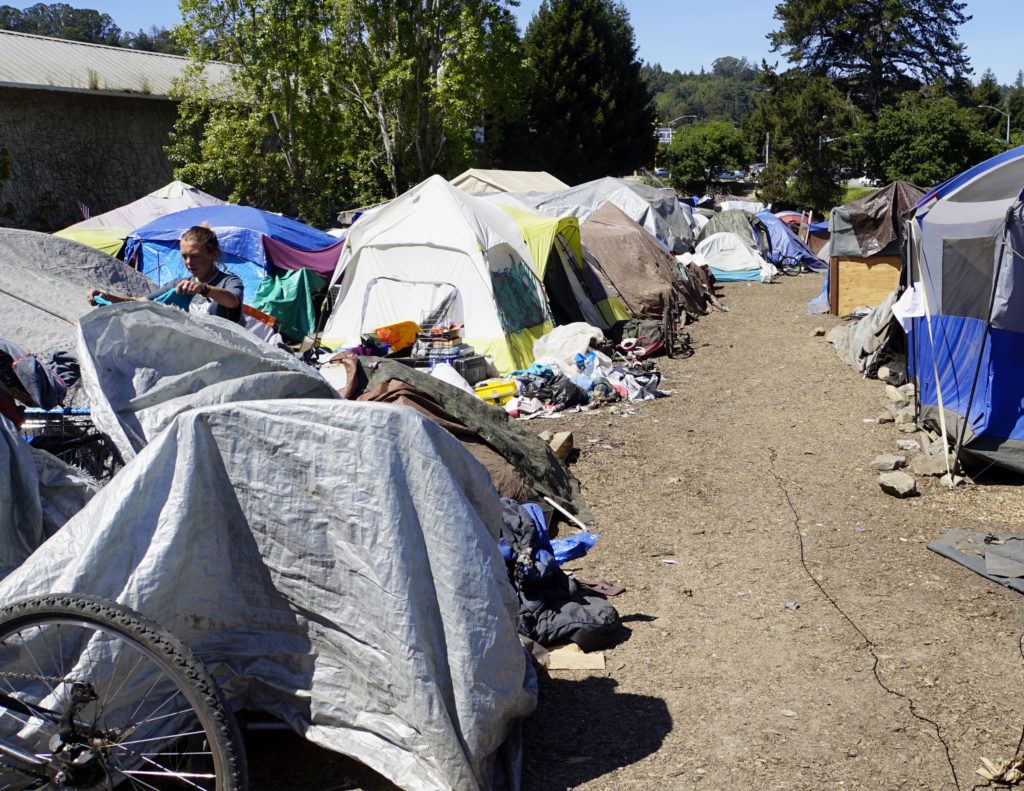
TRANSCRIPT
Kara Meyberg Guzman: This is Santa Cruz Local. And I’m Kara Meyberg Guzman.
For months, the City of Santa Cruz has struggled to close the Ross Camp, a homeless camp that sprung up along Highway 1 in November.
Here’s the latest chapter.
On Friday, the city’s top brass drove over the hill to a U.S. district court, to hear a judge’s decision on whether the city could legally close the camp. The mayor, the police chief, the city manager, the city attorney and other city leaders met with their opponents: a group of people who live at the Ross Camp and homeless advocates. That group sued the city, to try to keep the Ross Camp open.
No decision was made Friday. Judge Edward Davila tried to pursue a settlement, but negotiations stalled out after six hours. Both sides will return to San Jose on Monday morning, when the judge is expected to make a decision on whether the city could close the camp.
Meanwhile, the judge OK’d the city’s plan to continue moving anyone who wants to leave the Ross Camp to the Benchlands Camp. The city opened the Benchlands homeless camp on Tuesday, on the lawn behind the county government building. The Benchlands Camp has rules, fencing, storage, portable toilets and tents provided by the city. It’s scheduled to close by Wednesday.
One thing that the two sides of the lawsuit disagree on is whether the Ross Camp presents a health and safety risk. City leaders say yes. Homeless advocates, including Councilmember Drew Glover, say no.
I spoke with Police Chief Andy Mills and City Attorney Tony Condotti by phone Friday night and asked them about this disagreement. They were carpooling back from San Jose, and put me on speaker. That’s Condotti you’ll hear first, and then Mills.
CONDOTTI: Well you’re right. There is a big disagreement between those who purport to represent the plaintiffs and the city’s professional staff, who have extensive training in assessing health and safety conditions and whether or not there’s a significant risk.
The judge did express very serious concerns around the condition of the encampment and I think looked with some skepticism on the claims that, you know, there’s really no health risks out there, in the meantime, but unfortunately, was not able to render a decision upon that. And we need to go back to court and continue that discussion on Monday.
MILLS: I think he said something to the effect of, when he saw the photos, he was shocked at the conditions at the camp.
KMG: What the group from the Ross Camp wanted was to keep the camp open, but clean it and change whatever is needed to meet fire, safety and health standards.
Santa Cruz resident Keith McHenry is one of the 12 plaintiffs in the case. He’s a co-founder of Food Not Bombs, a group that feeds the hungry. He doesn’t live at the Ross Camp, but he’s been advocating for homeless people for a couple decades.
He said he’s tired of the same old song from the city. He said the city’s plan to close the Ross Camp doesn’t actually give any real solutions for the people living there. He said there aren’t enough shelter beds, even with the Benchlands Camp and the River Street Camp that’s about to open.
Plus, he says, how do we expect people to live with any dignity in managed camps like those, with fencing and strict rules and security? It’s more like a minimum security prison, Keith McHenry says.
MCHENRY: What the city is proposing, is that everyone just move back to people’s doorways, and hide in parking garages and in bushes along the levee and everything. So I mean, that’s really what they’re endorsing, is the idea of scattering those 200, 300 people, or even 150 people, depending on what the real count is, back into all these doorways. So that doesn’t sound like a great idea.
Or you could do what we’re proposing, which is to help us make the Ross Camp safe.
KMG: So what should we expect on Monday? The judge is going to decide not on the lawsuit itself, but on something called injunctive relief – basically whether the city can close the camp. I asked City Attorney Tony Condotti about what goes into that decision.
CONDOTTI: One of the things that the court is required to examine when it decides whether to issue injunctive relief is the balance of harm. Obviously if there are individuals in that camp who don’t want to leave, then they perceive the closing of the camp as being harmful to them. The judge has to weigh what their preferred location to pitch a tent at night is against the real and documented health and safety threats that we believe exist due to the camp’s location and the way it’s set up and the way it’s managed by the occupants of the camp themselves.
KMG: Before we go, I want to ask you something. What do you think about how the city is managing the closure of the Ross Camp? Do you see a better way to approach this? Send us a 20 second audio letter to the editor. Hit record on that voice recorder app on your phone, and email us the file at [email protected].
Thanks for listening to Santa Cruz Local. Visit our website at santacruzlocal DOT org for the transcript and more stories. Thanks to Podington Bear and sound of picture dot com, for the music. I’m Kara Meyberg Guzman. See you next time.
Kara Meyberg Guzman is the CEO and co-founder of Santa Cruz Local. Prior to Santa Cruz Local, she served as the Santa Cruz Sentinel’s managing editor. She has a biology degree from Stanford University and lives in Santa Cruz.


